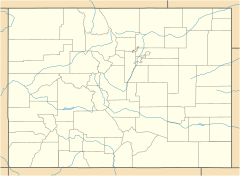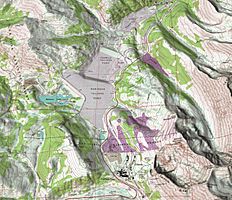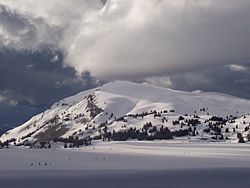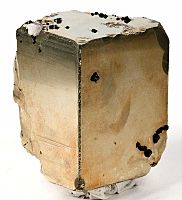Climax, Colorado facts for kids
Quick facts for kids
Climax, Colorado
|
|
|---|---|
|
Extinct town
|
|
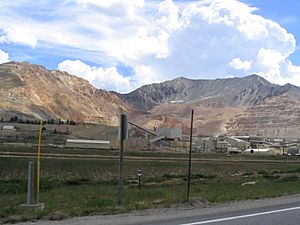
Climax mine, 2005
|
|
| Country | |
| State | |
| County | Lake County |
| Government | |
| • Type | unincorporated community |
| Elevation | 11,342 ft (3,457 m) |
| Time zone | UTC-7 (MST) |
| • Summer (DST) | UTC-6 (MDT) |
| ZIP Code (former) |
80429
|
Climax was once a busy mining town in Lake County, Colorado, United States. It was a special kind of town called a "company town," meaning a mining company owned most of it. Climax was also a railroad station and had its own post office.
This town was located very high up, at about 11,342 feet (3,457 meters) above sea level. This spot is on Fremont Pass, right on the Continental Divide of the Americas. The Continental Divide is like a giant line across the mountains where rivers on one side flow to the Atlantic Ocean and rivers on the other side flow to the Pacific Ocean.
The Climax railroad station was the highest one in North America for many years. It was built in 1884 and stayed the highest until 1904. Then, it became the highest again from 1928 until it was taken down in 1937.
Even though the town itself was removed in 1962, the Climax post office kept working for a long time. It opened on December 5, 1917, and closed on January 4, 1974. From 1919 to 1974, it was the highest post office in the entire United States!
Contents
History of Climax
Why Climax Existed: The Molybdenum Mine
Climax was created because of a huge amount of molybdenum ore found there. Molybdenum is a special metal used to make steel stronger and more resistant to heat. The Climax mine became the biggest molybdenum mine in the world. For many years, it provided about three-quarters of all the molybdenum used globally.
Over time, the mine changed. It started as one of the largest underground mines in the world. Later, it became an open-pit mine, which means they dug a huge hole in the ground to get the ore.
Climax Becomes a Ghost Town
Today, the village of Climax is known as a ghost town. This means people no longer live there. In 1962, the original town was taken down to make space for the mine to grow even bigger.
Before 1965, all the houses where people lived were moved to a different area called West Park, near Leadville, Colorado. Only the mining buildings were left behind.
The Railroad and Tourism
The old railroad line that used to go through Climax is now a tourist attraction. The Leadville, Colorado & Southern Railroad runs tours on this line. It stops at a spot where you can see the Climax Molybdenum Mine and Fremont Pass.
Climax is also a place that people visit by car, bike, or just to take photos. However, there are no shops or businesses there anymore, so it's not a well-known tourist spot.
The Mine Reopens
After being closed for 17 years, the Climax mine reopened. It started shipping molybdenum again on May 10, 2012.
People from Climax
Some notable people were born in Climax:
- Erbey Satterfield: He became a state legislator in Utah.
- Dave Gorsuch: He was an Olympian, meaning he competed in the Olympic Games.
Climate in Climax
A Cold and Snowy Place
Climax is known for its very cold weather. It's not only the highest place where people used to live in the main part of the United States, but also the coldest. The average temperature there is about 30.7°F (or -0.7°C) each year. This is probably the only place in the connected U.S. that stays below freezing on average!
The town has a cold mountain climate. Summers are short and mild, while winters are long and very snowy. Climax gets a lot of snow, about 294.7 inches (7.48 meters) every year. The most snow ever recorded in one season was 383.0 inches (9.73 meters) between July 1961 and June 1962. In December 1983, it snowed 105.3 inches (2.67 meters) in just one month!
Snow often stays on the ground until June. After a winter with lots of snow, it can even last into May. The deepest snow cover ever recorded was 94 inches (2.39 meters) on March 8, 2019.
Temperatures Throughout the Year
Because it's so high up, Climax is cold all year. It can even freeze in any month. On average, the temperature drops to 0°F (or -18°C) or colder about 53.5 mornings a year. This usually happens between November 1 and April 10.
Climax also has many days where the temperature never gets above freezing. On average, there are 99.6 such days each year. This usually happens from October 11 to May 4.
Even though it's very cold, the highest altitude can sometimes make it warmer than lower valleys during the coldest weather. The lowest temperature ever recorded was -33°F (or -36°C) on January 12, 1963, and again on December 23, 1990. The hottest temperature ever was 85°F (or 29°C) on July 7, 1981.
| Climate data for Climax, Colorado, 1991–2020 normals, extremes 1895–present | |||||||||||||
|---|---|---|---|---|---|---|---|---|---|---|---|---|---|
| Month | Jan | Feb | Mar | Apr | May | Jun | Jul | Aug | Sep | Oct | Nov | Dec | Year |
| Record high °F (°C) | 50 (10) |
53 (12) |
57 (14) |
62 (17) |
71 (22) |
78 (26) |
85 (29) |
84 (29) |
82 (28) |
73 (23) |
60 (16) |
52 (11) |
85 (29) |
| Mean maximum °F (°C) | 42.5 (5.8) |
43.6 (6.4) |
49.2 (9.6) |
53.5 (11.9) |
62.0 (16.7) |
71.7 (22.1) |
74.4 (23.6) |
72.2 (22.3) |
69.2 (20.7) |
61.0 (16.1) |
51.6 (10.9) |
43.1 (6.2) |
75.9 (24.4) |
| Mean daily maximum °F (°C) | 26.7 (−2.9) |
28.7 (−1.8) |
35.3 (1.8) |
40.3 (4.6) |
48.8 (9.3) |
61.2 (16.2) |
66.8 (19.3) |
64.1 (17.8) |
58.1 (14.5) |
46.8 (8.2) |
35.2 (1.8) |
26.5 (−3.1) |
44.9 (7.1) |
| Daily mean °F (°C) | 14.8 (−9.6) |
16.0 (−8.9) |
21.9 (−5.6) |
27.6 (−2.4) |
36.7 (2.6) |
47.7 (8.7) |
53.4 (11.9) |
51.5 (10.8) |
45.0 (7.2) |
33.9 (1.1) |
23.2 (−4.9) |
14.8 (−9.6) |
32.2 (0.1) |
| Mean daily minimum °F (°C) | 2.9 (−16.2) |
3.4 (−15.9) |
8.4 (−13.1) |
15.0 (−9.4) |
24.6 (−4.1) |
34.2 (1.2) |
40.0 (4.4) |
38.9 (3.8) |
31.9 (−0.1) |
20.9 (−6.2) |
11.3 (−11.5) |
3.2 (−16.0) |
19.6 (−6.9) |
| Mean minimum °F (°C) | −16.4 (−26.9) |
−14.2 (−25.7) |
−9.2 (−22.9) |
−1.8 (−18.8) |
9.8 (−12.3) |
22.4 (−5.3) |
32.1 (0.1) |
31.8 (−0.1) |
17.3 (−8.2) |
2.1 (−16.6) |
−10.1 (−23.4) |
−16.2 (−26.8) |
−20.7 (−29.3) |
| Record low °F (°C) | −33 (−36) |
−32 (−36) |
−24 (−31) |
−20 (−29) |
−10 (−23) |
10 (−12) |
19 (−7) |
18 (−8) |
6 (−14) |
−11 (−24) |
−27 (−33) |
−33 (−36) |
−33 (−36) |
| Average precipitation inches (mm) | 2.34 (59) |
2.05 (52) |
2.38 (60) |
2.90 (74) |
1.97 (50) |
1.10 (28) |
2.41 (61) |
2.55 (65) |
1.80 (46) |
1.69 (43) |
1.99 (51) |
2.05 (52) |
25.23 (641) |
| Average snowfall inches (cm) | 44.5 (113) |
40.5 (103) |
42.5 (108) |
46.6 (118) |
18.9 (48) |
2.4 (6.1) |
0.2 (0.51) |
0.1 (0.25) |
4.2 (11) |
22.4 (57) |
33.9 (86) |
38.5 (98) |
294.7 (748.86) |
| Average precipitation days (≥ 0.01 in) | 15.2 | 15.2 | 14.4 | 13.9 | 9.9 | 7.4 | 13.3 | 15.7 | 10.7 | 9.3 | 11.6 | 14.6 | 151.2 |
| Average snowy days (≥ 0.1 in) | 15.2 | 15.2 | 14.1 | 13.6 | 7.8 | 1.5 | 0.1 | 0.1 | 1.9 | 7.7 | 11.6 | 14.6 | 103.4 |
| Source 1: NOAA | |||||||||||||
| Source 2: National Weather Service | |||||||||||||
Gallery
-
Climax, Colorado is located on the continental divide at Fremont Pass.
-
A rare pyrite-tetrahedrite mineral from Climax.
See also
 In Spanish: Climax (Colorado) para niños
In Spanish: Climax (Colorado) para niños
 | George Robert Carruthers |
 | Patricia Bath |
 | Jan Ernst Matzeliger |
 | Alexander Miles |


